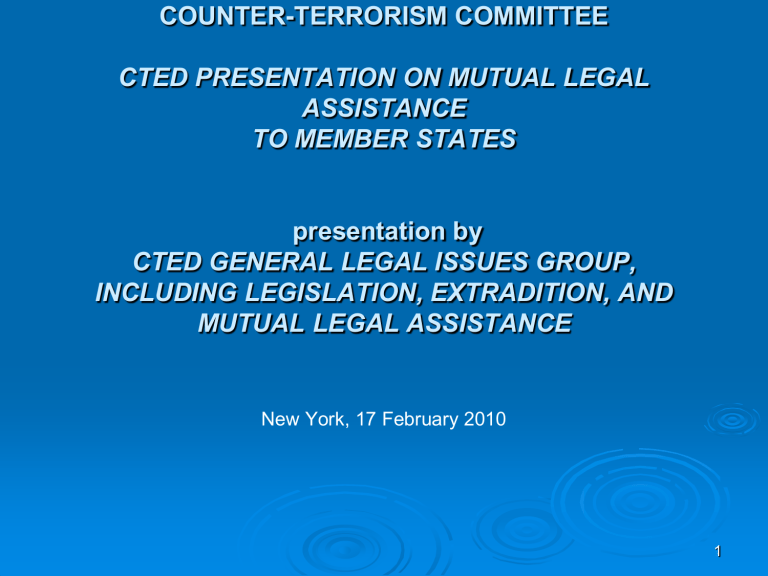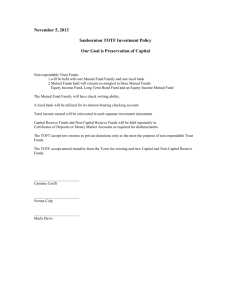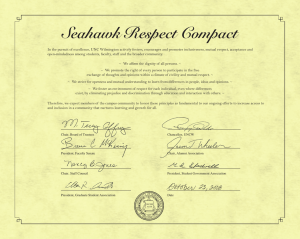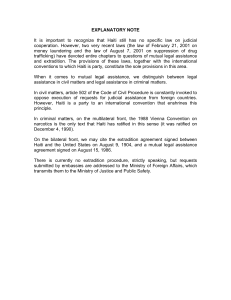Mutual legal assistance to member states

COUNTER-TERRORISM COMMITTEE
CTED PRESENTATION ON MUTUAL LEGAL
ASSISTANCE
TO MEMBER STATES presentation by
CTED GENERAL LEGAL ISSUES GROUP,
INCLUDING LEGISLATION, EXTRADITION, AND
MUTUAL LEGAL ASSISTANCE
New York, 17 February 2010
Introduction
In the Committee’s interim review of the work of CTED :
Thematic aspects of the implementation of Security Council resolution 1373 (2001)
Ways and means to enhance international legal and judicial cooperation.
Presentation on Mutual Legal
Assistance
I.
II.
III.
Framework for International Mutual
Legal Assistance
Practical challenges for effective international judicial cooperation
Human rights and international judicial cooperation
Framework for International Mutual Legal
Assistance
United Nations Security Council resolutions, including resolution 1373 (2001)
United Nations Global Counter-Terrorism
Strategy
International counter-terrorism conventions and protocols
UN Conventions against transnational organized crime
Bilateral treaties on mutual legal assistance
Relevant regional, sub-regional treaties
Domestic law
Security Council resolution 1373 (2001)
2. Decides also that all States shall:
(f) Afford one another the greatest measure of assistance in connection with criminal investigations….
3. Calls upon all States to:
(a) Find ways of intensifying and accelerating the exchange of operational information,
(b) Exchange information….and cooperate on administrative and judicial matters to prevent the commission of terrorist acts;
(c) Cooperate, …through bilateral and multilateral arrangements
(d) Become parties as soon as possible to the relevant international conventions and protocols relating to terrorism…..
(e) Increase cooperation and fully implement the relevant international conventions and protocols relating to terrorism and Security Council resolutions
United Nations Global Counter-Terrorism
Strategy
II. Measures to prevent and combat terrorism
To cooperate fully in the fight against terrorism
Endeavour to conclude and implement mutual judicial assistance and extradition agreements
To strengthen coordination and cooperation among States in combating crimes that might be connected with terrorism
6
International Conventions
Convention for the Suppression of Unlawful
Seizure of Aircraft, 1970:
“…..States shall afford one another the greatest measure of assistance in connection with criminal proceedings brought in respect of the offence…”
(article 10)
International Conventions
Convention on the Prevention and Punishment of Crimes Against Internationally Protected
Persons, Including diplomatic Agents, 1973
Increased requirements:
“States Parties shall afford one another the greatest measure of assistance in connection with criminal proceedings ……, including the supply of all evidence at their disposal necessary for the proceedings..”
International Conventions
International Convention for the Suppression of the Financing of Terrorism, 1999
States Parties may not refuse a request for mutual legal assistance on the ground of bank secrecy (article 12)
May give consideration to …sharing information or evidence needed to establish criminal, civil or administrative liability
(article 12)
Fiscal offence (article 13).
Bilateral arrangements
Bilateral arrangements may include the requirements of the various conventions to which they are a party.
Certain issues (e.g. cross-border investigations, controlled delivery, covert investigations and joint investigations teams between States) may be more easily achieved through a bilateral arrangement.
Domestic law
Does the State have a domestic legal framework covering mutual legal assistance (Acts of Parliament)?
Is the legislative framework broad enough to cover the obligations under resolution 1373 ( in particular refer to codification of offences, international instruments)
Member States may make requests for assistance to foreign States with which they do not have treaties
These requests for assistance are treated on a case-bycase basis and the receiving State will respond at its discretion, depending on its domestic law
Non-treaty requests may also be used where the State has a treaty with another State, but the type of offences or assistance may not be covered by the treaty.
Domestic law
A State may rely on a combination of domestic legislation, bilateral agreements, multilateral agreements, and regional or sub regional agreements
Domestic legislation may also include practices and procedures for the effective implementation of bilateral and multilateral agreements.
Dialogue with Member States
Codification
The State should have adequate measures on international legal cooperation obligations
Cooperate internationally (formally and informally)
Execute correctly mutual legal assistance requests
Legislation criminalizing the provision of safe haven to terrorists and their supporters by individuals or organizations.
Requests for extradition or mutual legal assistance based on a terrorist offence cannot be refused on the grounds that the offence is of a political nature.
Focus Areas: international legal framework
Implementation of Security Council resolutions, including resolution 1373 (2001)
Encouraging ratification of international instruments
Full implementation of the international instruments
Encouraging the use of the international instruments as a basis for mutual legal assistance
Encouraging the implementation of regional and sub regional instruments
Reviewing, modernizing and updating domestic law.
Focus areas: international legal framework
Promote best practices and facilitate capacitybuilding and training for members of the judiciary and law enforcement agencies in procedures for requesting and offering assistance in mutual legal assistance
Work with international, regional and sub regional organizations on effectively implementing modern tools, best practices, instruments and mechanisms for cooperation.
Sample References
United Nations Model Treaty on Mutual Legal Assistance (A/RES/45/116)
United Nations Office on Drugs and Crime, Revised Manuals on the Model
Treaty on Extradition and on the Model Treaty on Mutual Legal Assistance in
Criminal Matters
United Nations Office on Drugs and Crime, Guide For the Legislative
Incorporation and Implementation of the Universal Anti-Terrorism Instruments,
United Nations, New York, 2006
Implementation Kits for the International Counter-Terrorism Conventions,
Commonwealth Secretariat
Conference of the Parties to the United Nations Convention Against
Transnational Organized Crime (CTOC/COP/2008/L.5/Rev.1
Report Informal Expert Working Group on Mutual Legal Assistance Casework
Best Practice, UNODC, Vienna 2001
Rabat Declaration, Annex Convention on Extradition and Mutual Legal
Assistance in Counter-terrorism (A/62/939, S/2008/567)
ASEAN Treaty on Mutual Legal Assistance in Criminal Matters
Inter-American Convention on Mutual Assistance in Criminal Matters
Additional references see CTED presentation on “The Challenge of Effective
Judicial Cooperation.”





